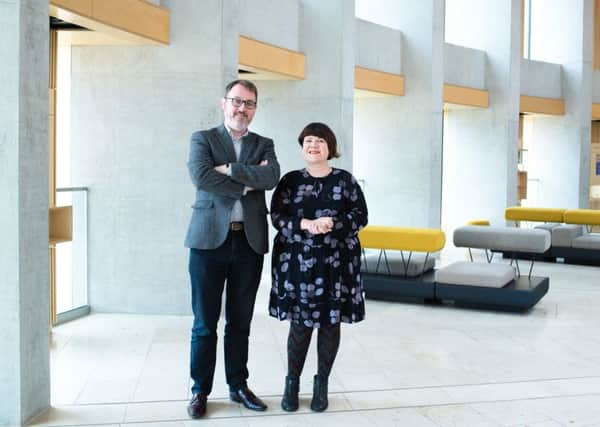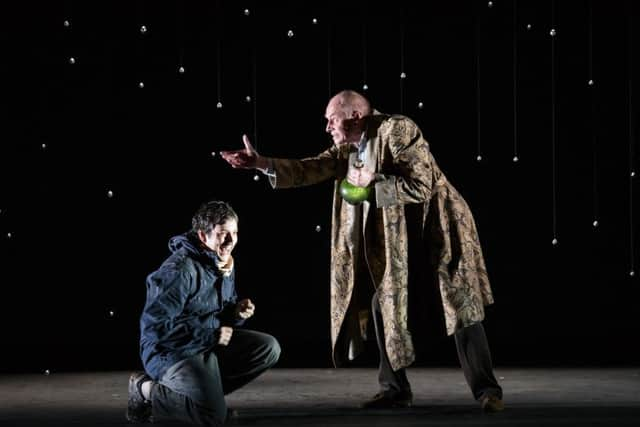Stuart MacRae on Anthropocene, his new show for Scottish Opera with Louise Welsh


Yes, there’s a geological theme, in that the action revolves around a research expedition in Greenland which comes across a frozen body in the ice surrounding their trapped ship. But what happens next is a tale of mystery and uncertainty.
“It’s essentially a kind of thriller,” says MacRae, whose active input into the plot was as important to him as writing the notes on the score. “Louise and I discussed the plot together for months on end. I suggested I wanted a piece where we trapped our characters in one remote place and explore their different reactions.
Advertisement
Hide Ad“So she came up with the idea of having a stranger or intruder who would upset the dynamics of the expedition team – a kind of catalyst for the changes that happen. In such a strange and remote place, when you bring in another character you think, where have they come from and what are they doing there? The unravelling of that mystery, and discovery of what led to those situations in this inhospitable place, is part of the thrill and intrigue.”


This is MacRae’s and Welsh’s fourth project together for Scottish Opera, a collaboration that began in miniature with Remembrance Day for the company’s groundbreaking Five:15 initiative in 2009, gradually expanding to Ghost Patrol in 2012 and the 90-minute Faustian tale, The Devil Inside, two years ago. This first full-length collaboration is therefore well-earned and highly anticipated.
For MacRae, though, it’s not simply a case of extending the operatic techniques he’s learned in the process, although the experiences of the earlier works certainly gave him the confidence to approach Anthropocene with an open musical mind. “Mostly it’s about knowing what instincts to trust,” he says. “I recognised that with a longer piece you need a greater variety of pacing. There are points where I deliberately slow the drama right down, others where it moves at a fast pace and should be exciting, edge-of-the-seat stuff.
“But with the longer time frame you can also hold way back and allow the possibility of entering one particular character’s mind, or exploring the relationship between two or three of them. These are moments where time almost stops. There’s also a wider range of musical styles: sections that are completely tonal, sections that are completely atonal, and lots in between.”
That’s a particularly interesting comment from MacRae, whose musical style – he is 42 and working full-time on significant commissions, including a major new work for this year’s Lammermuir Festival – has now blossomed into something he is comfortable with and can call his own. “I’m trying to include a lot more of myself in my music,” he reveals. “I’ve got past the stage of worrying about what people think I should be doing and now just write whatever I like.”
What that means, in real terms, is a broadening and softening of his expressive signature. “You know I love modernist music, which most of my earlier works reflect,” he tells me. “What you probably don’t know is that I love Rachmaninov, and that’s a side of my musical preferences that has rarely made it into my music.”
Advertisement
Hide AdIt is doing so now in a score he believes combines the operatic meat-and-veg of arias, duos and trios, with suggestive impressionistic tracts. “The sound of the engines failing near the start of the opera has these low grunting sounds from the orchestra as the ship struggles to get going,” he explains. “When the characters see the Northern Lights, that gave me an interesting colour palette to work with musically that then underpins the rest of the scene. I want audiences to experience things in the way the characters might be experiencing them. Music, carefully used, achieves that.”
Anthropocene has dominated MacRae’s life for over two years. With rehearsals under director Matthew Richardson now in full swing, what has been “a thing in my head” is now becoming “very real for me”.
Advertisement
Hide Ad“It’s so much bigger and more lifelike than I was able to imagine,” he says. “I’m really excited.”
*Anthropocene by Stuart MacRae and Louise Welsh is at the Theatre Royal, Glasgow, 24 and 26 January; and at the King’s Theatre, Edinburgh, 31 January and 2 February, www.scottishopera.org.uk